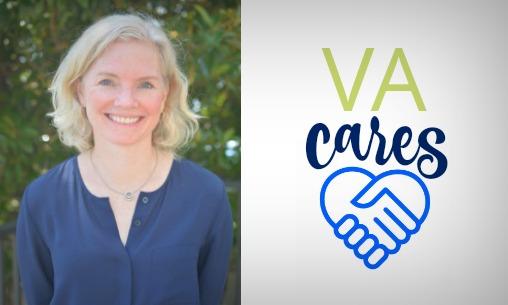
We are proud to show off some of the work Courtney Van Houtven, PhD, has been leading as Director of the VA Caregiver Support Program Evaluation.
Here is the project summary:
VA Caregiver Support Program Partnered Evaluation Center
Principal Investigator: Courtney Van Houtven, PhD, Professor of Medicine (GIM)
Co-Investigators: S. Nicole Hastings, Eugene Oddone, Matthew Maciejewski, Nina Sperber, Maren Olsen, Darryl Wieland, Karen Steinhauser, Corrine Voils, Cristina Hendrix, Karen Stechuchak, Merritt Schnell, Jennifer Lindquist, Valerie Smith, Sara Morris Andrews, Bradley Dokter, Lesa Powell, Katherine Ramos, Theodore Berkowitz, Rebecca Bruening, Laurie Marbrey, Katherine Miller
Project Staff: Margaret Kabat, Margaret Campbell-Kotler, Jennifer Henius, Amy Kilbourne
The Caregivers and Veterans Omnibus Health Services Act of 2010 enacted two landmark programs to ensure training, services and assistance for family caregivers of Veterans throughout the Department of Veterans Affairs (VA) programs and services. First, the Program of Comprehensive Assistance for Family Caregivers (hereafter PCAFC) provides a program of support for both the Veteran and the family caregiver and a series of supports for the family caregiver such as a monthly stipend, access to health care if not already covered under a health insurance plan, education and training, travel, lodging and subsistence, respite care and caregiver mental health services. PCAFC aims to reduce strain for caregivers by providing financial stipends to those who care for Veterans who need assistance with Activities of Daily Living (ADLs) or supervision or protection because of the residual effects of a serious injury (ies) sustained in the line of duty on or after September 11, 2001. Second, the Program of General Caregiver Support Services (hereafter The General Program) enhances support and services for family caregivers through training and education. The VA responded rapidly to and met the requirements of P.L. 111-163, placing at least one full time Caregiver Support Coordinator (CSC) in each of the 152 VA Medical Centers; (VAMC) developing a comprehensive training curriculum for caregivers and facilitating Caregiver access to many other services. Management of both PCAFC and The General Program is provided by VA Caregiver Support Program (Hereafter CSP). With the creation of these two programs, the Caregivers and Veterans Omnibus Health Services Act of 2010 provided an unprecedented level of support for caregivers.1
Uptake in PCAFC far surpassed expectations, with 45,000 applicants and expenditures of more than $1 billion from its inception in May, 2011 to May, 2015. As a result, return on investment is of immediate interest to CSP and its stakeholders. It is critical to understand how the assistance provided by CSP, including caregiver training, stipends, and other services (e.g., health insurance, mental health care) has affected caregivers’ well-being, including financial and/or emotional strain, and health. Understanding how CSP impacts Veterans’ health and economic outcomes is also critical. Additionally, with great heterogeneity among caregivers being served in either PCAFC or the General Program, it is vital to understand what caregivers regard as the most useful CSP services.
Key Findings
Veteran Healthcare Utilization: Veterans in PCAFC had similar acute care utilization compared to those in the control group, but significantly greater primary, specialty, and mental health care use at least 30, and up to 36, months post-enrollment.
Caregiver Well-being: Promising trends in improved well-being were found in PCAFC caregivers in a small, non-representative survey sample.
Use and Value of Services by Caregivers: The stipend and multiple other CSP components, such as training and CSCs, were highly valued by caregivers in PCAFC. Caregivers in The General Program valued training, support groups, and CSCs.
Summary of Evaluation Aims and Findings
Aim 1. Assess the impact of PCAFC on Veteran health care utilization.
Aim 1.(Follow-up) Assess the impact on 3-year Veteran health care costs.
Aim 2.a. Provide a snapshot of PCAFC participant characteristics and factors associated with well-being.
Aim 2.b. Assess the impact of PCAFC on participant well-being.
Aim 3.a. Assess the use and value of CSP to PCAFC participants.
Aim 3.b. Assess the use and value of CSP to participants of The General Program.
Aim 4. Provide a synthesis of highest value components of CSP.
Aim 5. Conduct formative evaluation of the Comprehensive Program application process to identify areas and approaches for improving consistency across VA.
Aim 6. Examine discharges from the Program of Comprehensive Assistance for Family Caregivers.
_____________________________
Tell us about your clinical research or your projects in education or clinical practice.
Write to GIM Communications Strategist, Clare Il’Giovine